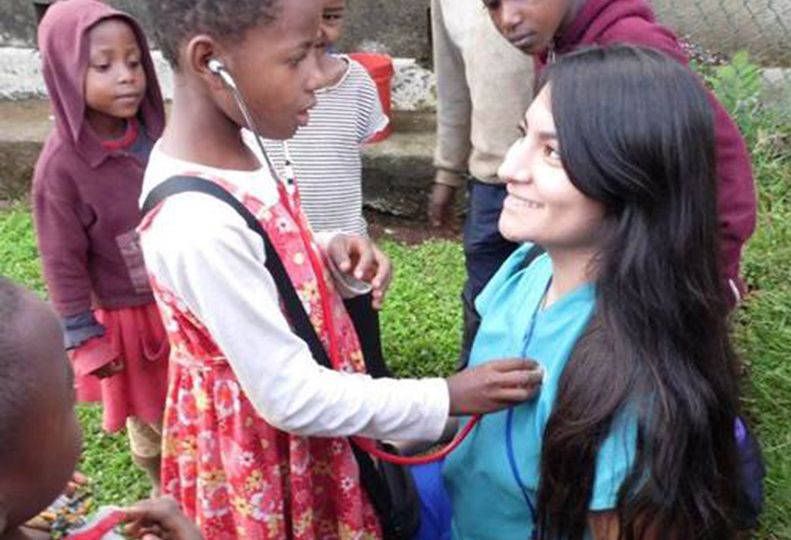
Home » International Service Learning centralizes in downtown Spokane
International Service Learning centralizes in downtown Spokane
ISL employs 200 people throughout organization

July 30, 2015
International Service Learning, a nongovernmental organization that offers volunteers practical experience in medical, education, and community enrichment programs, has centralized its headquarters in downtown Spokane in a transition from years of remote staffing.
The company, led by second-generation executive director Jonathan Birnbaum, has leased a 1,500-square-foot office space on the third floor of the Empire State Building, formerly known as the Great Western Building, at 901 W. Riverside. Following renovations the organization expects to triple the size of its office space.
ISL has been continually increasing its number of service locations and volunteer partners. While the Spokane office currently has six staff, ISL employs approximately 200 full-time, part-time, and seasonal workers in various locations. The organization has a current 2014 budget of about $3.7 million.
Birnbaum, whose father, Michael Birnbaum, founded the organization in 1992, is originally from Stockton, Calif., but grew up in Corpus Christi, Texas. He purchased ISL from his father several years ago. Following time serving at Fairchild Air Force Base, Birnbaum and his family maintained an interest in Spokane, and currently live north of the city in the Clayton area. Birnbaum is currently a major in the Alaska Air National Guard.
In a recent press release Birnbaum noted that the move to Spokane represents a dramatic change in the organization’s culture.
“Spokane uniquely fits all our needs,” he said. “I believe that for this organization to succeed, we need to have a space that cultivates excellence while being comfortable. Spokane has a wide pool of talent to recruit from, a range of amenities to help with retention and a community that not only supports, but is also enthusiastic about our mission.”
Robb Anthony, marketing director for the organization, agrees with Birnbaum’s assessment, saying, “Spokane is a medical community and also has several universities. Many of our volunteers are college students, or individuals seeking volunteer opportunities in the medical field. In Spokane, there are a lot of ways for us to sync our goals with those of the community.”
Throughout the year, ISL offers short-term service learning opportunities of two to three weeks in 12 different countries—Belize, Colombia, Costa Rica, Cuba, Dominican Republic, Hati, Jamaica, Mexico, Nicaragua, Panama, Peru, and Tanzania.
Volunteers travel to the country of their choice and meet with staff who train them in medical services as per the country’s requirements and then allow for hands-on experience. Team managers in each location meet with volunteers and serve as experienced liaisons. Volunteers chose from three types of programs: medical, enrichment, and adventure. Each category has ways of combining service work, as well as interactions with cultures and communities.
“The organization’s mantra is ‘Travel, Learn, Serve,” Anthony says. “For example, one third of Belize gets their health care only through ISL through an arrangement we established with their ministry of health. For us it’s about making a lasting impact in these communities.”
The organization’s primary revenue comes from the volunteers themselves, who raise money for their travels through fundraising or donations, according to its website. About 7 percent of revenues go toward overhead costs, about 83 percent go toward programing resources to educate volunteers once they arrive, and the remaining 10 percent is given as gifts, grants and direct aid by ISL, the website says.
“The number of volunteers available determines the number of staff on-site in any location,” says Anthony. “With more volunteers comes the need for more drivers, translators and medical staff to train them. It really varies by country and need.”
Trips can cost volunteers anywhere from $900 to $2,000.
With these trips being funded through volunteers, overhead costs are kept to a minimum and ISL can operate in those countries where the right number of volunteers are available.
Last year, the organization had 1,500 volunteers to travel. This year they have already passed that number and predict at least 1,800 travelers.
In moving its headquarters to Spokane, ISL is definitely expecting continued growth.
“Spokane is large enough that we’ve been talking about making room for setting up some local programs,” Anthony says. “So many of our travelers return home from a trip with this leftover excitement and eagerness to share their experience with their own community. I think in the future we could find ways of harnessing volunteers and addressing issues right here in Spokane.”
Latest News Education & Talent
Related Articles
Related Products



![Brad head shot[1] web](https://www.spokanejournal.com/ext/resources/2025/03/10/thumb/Brad-Head-Shot[1]_web.jpg?1741642753)
